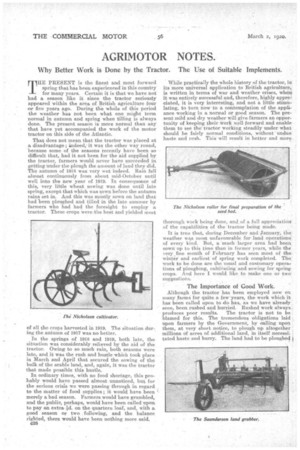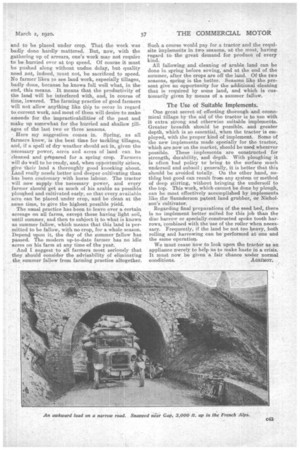AGRIMOTOR NOTES.
Page 28

Page 29

If you've noticed an error in this article please click here to report it so we can fix it.
Why Better Work is Done by the Tractor. The Use of Suitable Implements.
THE PRESENT is the finest and most forward spring that has been experienced in this country for many years. Certain it is that we have not had a season like it since the tractor seriously appeared within the area of British agriculture four or five years ago. During the whole of this period the weather has not been what ono migrrit term normal in autumn and spring when tilling is always done. The present season is more normal than any that have yet accompanied the work of the motor tractor on this side of the Atlantic.
That does not mean that the tractor was placed at a disadvantage; indeed; it was the other way round, because some of the seasons recently have been so difficult that, had it not been for the aid supplied by tho tractor, farmers would never have succeeded in getting under the plough the amount of land they did. The a.uturon of 1918 was very wet indeed. Rain fell almost continuously from about mid-October until well into the new year of 1919. In consequence of this, very little wheat sowing was done until late spring, except that which was sown before the autumn rains set in. And this was mostly sown on land that had beenploughed and. tilled in the late summer by farmers who had had the foresight to employ a tractor. These crops were-the best and yielded most of all the crops harvested in 1910. The situation dur. ing the autumn of 1917 was no better.
In the springs of 1918 and 1919, both late, the situation was considerably relieved by the aid of the tractor. Owing-to so much rain, both seasons were late, and it was the rush and hustle which took place in March and April that secured the sowing of the bulk of the arable land, and, again, it was the tractor that made possible this hustle.
In ordinary times, with no food shortage, this probably would have passed almost unnoticed, but for the serious crisis we were passing through in regard to the matter of food supplies; it would have been merely a bad season, Farmers would have grumbled, and the public, perhaps, would have been called upon to pay an extra 1-d. on the quartern loaf, and, with a good season or two following, and the balance righted, there would have been nothing more said.
038
While practically the whole history of the tractor, in its more universal application to British agriculture,: is written in terms of war and weather crises, whei* it was entirely successful and, therefore, highly appre4 elated, it is very interesting, and not a little stimixlating, to turn now to a contemplation of the appliance working in a normal or good season. The present mild and dry weather will give farmers an opPortunity of keeping their Work well forward and enable them to see the tractor working steadily under what should be fairly normal conditions, without -unarm haste and rush. This will result in better and More.
thorough work being done,and of a full appreciation . of the capabilities of the tractor being made.
It is true that, during December and January, the, weather was most unfavourable for land operations:. of every kind. But, a mach larger area had been. sown up to this time than in former years, while the. very frrie month of February has seen. most of the winter" and earliest; of spring work completed. The work to be done are the usual and customary operations of ploughing, cultivating and sowing for spring, crops. And here I would like to make one or two;
suggestions.
The Importance of Good Work.
Although the tractor has been employed now on many farms for eluite a few -years, the work which it has been called upon to do has, as we have already seen, been rushed and hurried. Bushed work always , produces poor results. The tractor is not to be blamed for this. The tremendous obligations laid ! upon farmers by the Government, by calling upon them, at very short notice, to plough up altogether millions of acres of additional land, in itself necessil fated haste and hurry. The land had to be ploughed and to be placed under crop. That the work was badly done hardly mattered. But, now, with the gathering up of arrears, one's work may not require to be hurried over at top speed. Of course it must be pushed along without undue delay, but quality need not, indeed, must not, be sacrificed to speed. No farmer likes to see land, work, especially tillages, badly done, because he knows full well what, in the end, this means. It means that the productivity of the land will be interfered with,, and, in course of time, lowered. The farming practice of good farmers will not allow anything like this to occur in regard to current work, and most of them will desire to make amends for the impracticabilities of the past and make up somewhat for the hurried and shallow tillages of the last two or three seasons.
Here my suggestion comes in. Spring, as all farmers know, is the best time for tackling tillages, and, if a spell of dry weather should set in, given the necessary power, acres and acres of land can, be cleaned and pfepared for a spring crop. Farmers will do well to be ready, and, when opportunity arises, give their land a thoroughly good knocking about. Land really needs better and deeper cultivating than has been customary with horse labour. The tractor will now supply the necessary power, and every farmer should get as much of his arable as possible ploughed and cultivated early, so that every available acre can be placed under crop, and be clean at the same time, to give the highest possible yield.
The usual practice has been to leave over a certain acreage on all farms, except those having light soil, until summer, and then to subject it to what is known as summer fallow, which means that this land is permitted to be fallow, with no crop, for a whole season. Depend upon it, the day of the summer fallow has passed. The modern up-to-date farmer has no idle acres on his farm at any time of the year.
And I suggest to all farmers most seriously that they should consider the advisability of eliminating the summer fallow from farming practice altogether. Such a course would pay for a tractor and the requisite implements in two seasons, at the most, having regard to the •great demand for produce of every kind.
All fallowing and cleaning of arable land can be done in spring before sowing, and at the end of the summer, after the crops are off the land. Of the two seasons, spring is the better. Seasons like the present give an opportunity for the additional cleaning that is required by some land, and which is customarily given by means of a summer fallow.
The Use of Suitable Implements.
One great secret of effecting thorough and economical tillage by the aid of the tractor is to use with it extra strong and otherwise suitable implements. Greater breadth should be possible, and greater depth, which is so essential, when the tractor is employed, with the proper kind of implement. Some of the new implements made specially for the tractor, which are now on the market, should be used wherever possible.. These implements are constructed for strength, durability, and depth. With ploughing it is often had policy to bring to the surface much undersoil and subsoil ; generally, it is better that this should be avoided totally. On the other hand, nothing but good can result from any system or method of deep stirring, without bringing the undersoil to tho top. This work, which cannot be done by plough, can be most effectively accomplished by implements like the Saunderson patent land grubber, or Nicholson's cultivator.
Regarding final preparations of the seed bed, there is no implement better suited for this job than the disc harrow or specially-constructed spoke tooth harrows, Combined with the use of the roller when necessary. Frequently, if the land be not too heavy, both rolling, and harrowing can he•performed at one and the same operation.
We must cease. now to look upon the tractor as an appliance merely to help us to make haste in a crisis. It must now be given a fair chance under normal conditions. AGEIMOT.


































